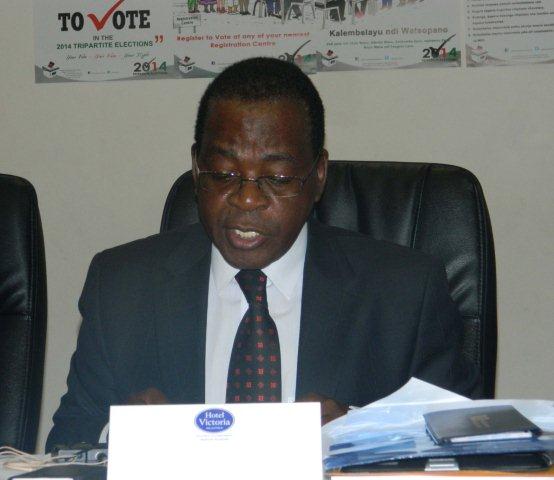The Malawi Electoral Commission (Mec) has rejected the idea of involving the cabinet in the reforms of the country’s electoral laws.
Mec Chairperson, Maxon Mbendera, has suggested that proposals for amendment to electoral laws should instead go directly to Parliament rather than undergoing the process of vetting by the cabinet.
Mbendera made the suggestion in Lilongwe on Thursday in his keynote address to Malawi Tripartite 2014 Post-Election Review Conference organised by Malawi Electoral Support Network (Mesn).
“Even before nuances of election legal reforms are highlighted, we must examine the process by which reforms are brought before the legislature. If they are treated as regular legal amendments and are vetted by cabinet prior to their submission to the National Assembly, they may not be subjected to full scope of political discussion and consensus necessary to support election reform.
“The possibility that election reform amendments be treated uniquely, submitted directly to the National Assembly, may be a necessary consideration,” Mbendera said.
In an interview after his address, Mbendera highlighted that the issue of eight-day limit to announce results of the elections was addressed in their amendment proposals.
But cabinet maintained the eight-day limit to apply for all elections, namely, presidential, parliamentary and local government elections.
Mbendera said the decision to announce the elections within eight days was made in the 1990s.
“But that time there were 194 elections: 193 parliamentary elections and one presidential election. But with additional 462 local government elections, we proposed that results for presidential elections should be announced within eight days, parliamentary elections within 14 days and Local government elections within 21 days. This could have given us enough time to concentrate on one election at a time. Unfortunately, cabinet shot down the proposal and took eight days for all elections,” Mbendera said.
The Mec chair also registered concern over qualification and incentives of political parties and candidates to enter elections. He noted that out of 57 registered political parties, only few parties sponsored candidates in the elections. Two of them fielded candidates in all parliamentary constituencies.
British High Commissioner, Michel Nevin, said while the major focus on the just-ended elections has been on the negatives, there is need to nurture the positives.
“As we gather here, we should not only think about the negatives of the election but also the positives. The elections were peaceful. There was a peaceful campaign period. There was much less mudslinging by candidates. They concentrated on issues rather than personalities,” Nevin said.
He, however, mentioned such areas as increase in number of null and void votes, little time given to Mec to perform its role and what he termed as ‘legal grey areas’ as some issues which have to be addressed.
He also stressed on the need for constant funding to Mec.
“Mec needs dedicated funding not only for a few days before elections. Elections should be treated as a cycle. Again, the donor community should not be funders. Elections should be funded locally to ensure ownership of the elections,” Nevin added.
Mesn organised the two-day conference with funding from Danish Church Aid, Norwegian Church Aid, UK Aid and National Democratic Institute (NDI).
Some participants in the conference included Mec, civil society, political parties, media, security forces and religious bodies.


No comments! Be the first commenter?